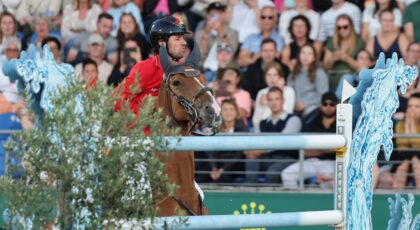I was watching the news the other day and they were talking about the poor air quality caused by wildfires.
The news team decided to go to Hastings Racecourse to see how the horses were fairing since the races had been cancelled due to the smoke.
They showed a clip of a pony horse ponying a horse, and the reporter made some clever comment about the pony horse having an easy day. I then thought about what a confusing term pony horse must be for non-horse people. We know it means a rider on one horse is leading another horse(s). But where is this written? Have we coined our own term, again?
I doubt I will find a peer-reviewed journal on this subject, but I will see what I can find. Equestrians know the difference between a pony and a horse, but I suspect not everyone does. And when the term pony horse is directed at an actual horse, what do others think? It’s half horse and half pony, which technically it could be, but unlikely.
Pony
I pulled out my trusty Penguin Dictionary to see what they had to say about the word pony.
- “A small horse under 14.2” – I do love that the dictionary knows how horses are measured.
- Informal British – “a sum of £25.” – That’s a new one for me.
-The Penguin Dictionary
But that is all my dictionary told me and I felt cheated because we are using pony as a verb, not a noun. So, I turned to my Webster’s New Thesaurus and now I have lost all faith in this book, because it told me the best and only synonyms for pony are bronco and mustang. And while we may believe this to be true, I doubt very much my thesaurus is being facetious.
This is the very reason movies and books get things so wrong about horses. “Hi, yes I am looking to buy my 5-year-old a bronco.” This would be met with a grimace no doubt and the loving mother would rephrase her statement, “Well by bronco I mean a mustang. I want to buy my sweet child a mustang.”
Then the thesaurus said, “see also horse“. It felt like a choose your own adventure book, and so I turned to page 207 with child-like excitement on the brink of discovery. The first word on offer was nag. My thesaurus was unwittingly getting closer to the recycle bin. The next bunch of words were draft animal, plow horse, racer… piebald, pinto, palomino, Arabian, stallion, courser and see also animal.
I know these words are only supposed to relate to the word horse but, honestly, what an odd selection.
Naturally, I was intrigued by the word courser, so I went back to my dictionary, and I think we need to bring this word back into circulation, even though my word document is spewing red lines in protest.
Courser: “swift powerful horse; a charger.”
-The Penguin Dictionary
“Boy, your horse is a real courser,” you could say. “You’re sitting on a real courser there, aren’t you?” It’s a good word. Horse of courser.
But I digress.
We also use the word pony when speaking about polo ponies, even though they are horses, and in reference to playing the ponies when you bet on racehorses. It makes sense to us, but it must be confusing for others.
The verb to pony
You probably won’t find it on the list of verbs when studying the English language, but it is a verb, just not the way I want it to be.
When pony is acting as a verb it is doing so in the action of paying money. For example, you might say, “I have to pony up the board money for my…pony,” because of course you are a good boarder as well as punny.
Etymology
I turned to one of my favourite websites, etymonline.com, which gives me the etymology of words.
In the 1650’s the Scottish used powny, to mean “a very small horse”, and in the 15th century the obsolete French word poulenet, meant “little foal”. The list goes on and on in the same vein, so I feel we can deduce that pony means small or little. But that does not get us any closer to the source of the term pony horse in the world at large.
The rabbit hole of research
Searching the term pony horse on the internet only turns up how-to articles and what I’m looking for is This is Exactly Where the Term Pony Horse Comes From with a network of links leading me to substantiated material proving without a doubt the very interesting story behind such an odd term.
I’ve been warned that my expectations in life are too high, and I should know by now that I’m riding for a fall, to keep my shortcomings on theme.
Being unable to find an article dedicated to the history of this term raised my irritation to an unreasonable level and I stabbed the word ponying into my keyboard, which turned up only one source: Wikipedia, our go-to site for untrustworthy information. However, what Wikipedia lacks in correctness it makes up for with (sometimes useful) references.
The “article” was kind enough to tell me what ponying a horse is all about, but nothing more.
I give up. And by “give up” I mean I am going to keep researching this but not drag you along with me while doing so. I will let you know if I find the answer.
Two hours later…
I found nothing, which is annoying because all I want to know is why we use the word pony instead of, lead when talking about leading a horse from the back of another horse. Since I’m unable to find the true reason, I think we are going to be left to our own devices.
A friend of mine, whom I call Big Anne, who is actually very small but marginally larger than my other friend Little Anne, thought perhaps it’s, “A catch-all description of the cold-blooded, quieter type used to calm thoroughbreds.” Sounds good to me, even if we remove the word thoroughbred because of course horses of all sorts are ponied.
I have enlightened no one with this post, but at least now, should you wonder about the term, you won’t bother researching it because we, as a collective group, over the centuries have made the term up ourselves. I think.


 September 27, 2022
September 27, 2022 

























